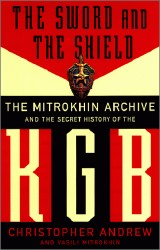CRUFFLER.COM
presents
Book
Review, November 1999:
| The
Sword and the Shield: The Mitrokhin Archive and the Secret History
of the KGB
by Christopher Andrew and Vasili Mitrokhin Basic Books, 1999 Hardcover, 720 pages ISBN 0465003109 |
 |
Political power, Chairman Mao once noted, grows from the barrel of a gun. While this, in a nutshell may be much of the impetus that drives the urge to cruffle, to concentrate only on the field of battle as an explanation of history is to miss many of the nuances and behind the scenes work that shaped the battles and the battlefields, and indeed, history itself. Of this historical behind the scenes work, none grabs the imagination more than the cloak and dagger world of espionage and covert operations. Truth, however, is often more fascinating than the concoctions of the imagination. The Sword and the Shield: The Mitrokhin Archive and the Secret History of the KGB is just such a work of non-fiction. It is what the FBI calls "the most complete and extensive intelligence ever received from any source."
In 1992, a Russian walked into a British embassy in one of the Baltic republics and asked to speak to "someone in authority." While drinking the proffered cup of tea, the Russian handed over a small sheaf of typewritten notes. Some eight months later, the Russian, his family, and an enormous archive had been spirited away to the United Kingdom. When the news broke in 1996 that a KGB officer had defected, and had brought with him the names of hundreds of Soviet secret agents, it was greeted with incredulity. Said an SVR (the KGB's successor organization) officer: "Hundreds of people! That just doesn't happen! Any defector could get the name of one, two, perhaps three agents -- but not hundreds!"
The Russian in question was Vasili Nikitich Mitrokhin, who had for many years served as the archivist for the First Chief Directorate (FCD), the foreign intelligence branch of the KGB. Mitrokhin was responsible for moving, checking, and sealing approximately 300,000 files during the move from the KGB's old headquarters in Moscow to the "new" building in Yasenevo, and thus gained unrestricted access to these most closely guarded tomes. Over the years, Mitrokhin had begun to experience grave doubts about the Soviet system. Mitrokhin had some hard choices to make: Stay silent, resign, or work against the system from within. Mitrokhin decided on the latter course of action. To further his covert dissidence, Mitrokhin began to assemble a record of the foreign intelligence operations of the KGB. He began by smuggling out bits of paper covered with tiny handwritten notes in his shoes, but later grew more bold, taking notes on ordinary office paper, taken out in the pockets of his coat. These notes were hidden under Mitrokhin's mattress, and on the weekends taken to his dacha, where they were typed up and hidden in milk containers buried unde the floor. When Mitrokhin defected, his archive contained tens of thousands of pages.
Three years later, in 1995 Mitrokhin contacted Christopher Andrew, head of Cambridge University's history faculty and a widely recognized historian in the field of international intelligence. The Sword and the Shield is the result of their meeting. Among other things, the book details the KGB's foreign intelligence operations against the "Main Adversary" (the United States) and Great Britain. In this 700 plus page tome, the reader learns about operations aimed at discrediting well known Americans from Ronald Reagan to Martin Luther King to Richard Nixon, secret arms caches that are still hidden (and boobytrapped!!!) throughout the territory of the Soviet Union's western adversaries. The book touches on the KGB's disinformation efforts, to include forging a letter from Lee Harvey Oswald so as to implicate the CIA in the assassination of John Fitzgerald Kennedy. The reader will be riveted as he or she learns of the KGB attempts to stir up racial hatreds by sending hate mail and bombs, and even the existence of deep cover agents in Europe and North America, some of whom had their covers "blown" by the book's publication.
Andrew's writing complements the subject matter nicely. His sentences are concise, forceful, and clear. While there isn't the sense of an artist at work with language as with books by John Keegan, the writing doesn't in the least detract from the book. This is a book that is at once historical and contemporary, and which no student of twentieth century history and/or geopolitical affairs can afford to be without. As Andrew notes: "No one who spied for the Soviet Union for any period between the October Revolution and the eve of the Gorbachev era can now be confident that his or her secrets are still secure."
The
Sword and the Shield: The Mitrokhin Archive and the Secret History
of the KGB
is available
from Amazon.com. Click on the image to order:

|
|